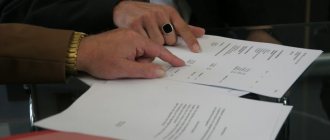Where do penalties come from and what do they lead to?
The obligation to pay for housing and communal services - on time and one-time in full for the month - is enshrined in regulatory documents, namely the Housing Code (Part 1, Article 153). Standard practice: rent must be paid by the 10th of the current month. If there is another agreement between the companies providing services and residents, the payment date may be postponed to any day of the month.
Delay in payment is considered a violation of the law and can be punished in various ways:
- first, “light” means fines and penalties;
- then more severe - cessation or suspension of the supply of electricity, gas, etc.;
- finally, eviction.
Ignoring the penalty accrued on a utility debt for late payment is punishable, since it is an integral part of the debt, subject to mandatory repayment. But, besides repayment, there is another way to say goodbye to penalties. You can try to appeal them in court by presenting reasonable objections. Failure to pay penalties has the same consequences as refusal to repay the principal debt.
How to write off utility debts?
The write-off method varies depending on the specific situation. In each case, it is necessary to rely on legislative norms.
Upon change of owner
The owner's obligation to pay for housing and communal services arises at the moment of full ownership of the property. It begins after registration of property rights in Rosreestr (clause 5, part 2, article 153 of the Housing Code of the Russian Federation).
The new owner of the property is not required to answer for the debts of the previous owner. He does not receive a utility bill along with the apartment (Article 210 of the Civil Code of the Russian Federation). The accumulated debt remains with the seller. The management company has no right to demand it from the buyer.
If a citizen receives an invoice for services that were provided to the previous owner, he needs to contact the management company. The application must indicate the requirement to recalculate the financial-personal account or open it in the name of a new owner. It is necessary to prepare two copies of the document and submit them personally. On the second, you need to ask to put a mark of acceptance and date.
If personal appeal is not possible, the document is sent by registered mail. A notification of delivery should be generated and an inventory of the attachment should be made.
The management company must respond to the appeal within 30 days. If it is absent or refuses to satisfy the requirements, you can go to court.
In case of bankruptcy of an individual
Debt write-off is possible in connection with the bankruptcy of an individual after going through a procedure in court.
This can be done subject to several conditions (Article 213.3 of the Federal Law “On Insolvency (Bankruptcy)” No. 127 - Federal Law of October 26, 2002):
- the amount of debt is more than 500 thousand rubles (the totality of all debt obligations);
- the amount of income does not allow repayment of debt;
- the period of delay in payments for utilities and other obligations is more than 90 days.
How are they calculated?
The formation of penalties is regulated by law - in the Housing Code (Article 155). Part 14 of this article provides a diagram by which the amount of the penalty is calculated:
- failure to make a payment on the 1st to 31st day following the payment date does not lead to the application of sanctions;
- lack of payment on the 31st–90th day is a signal to start accruing penalties; for every day of delay, 1/300 of the refinancing rate in effect at the time of payment is added to the debt (from September 17, 2020 - this is 7.5%);
- if the 91st day has passed, but the debt remains, the size of the sanction will be increased - up to 1/130 of the rate for each day of non-payment.
Information
To check the correctness of the calculation of the penalty, you need to focus on the period of delay in payment. Additionally, it is worth considering the content of the agreement with resource suppliers and the management company.
What debt is considered critical?
The Housing Code of the Russian Federation establishes that payments for housing and communal services should be made before the 10th day of the new month or within the time limits established in the agreement between the supplier and the consumer. The debt begins to accumulate from the first day after the payment was due - from the 11th. For the unpaid amount, utility companies have the right to charge a daily penalty in the amount of 1/300 of the Central Bank refinancing rate.
As of mid-June 2020, it is set at 7.75%. For a day of late payment in the amount of 5 thousand rubles, the penalty will be 1.3 rubles. In the fourth month, the penalty will be increased to 1/130 of the CBR rate per day. The amount of the fine is insignificant, but taking into account the constantly growing “body” of the debt, the longer the debt accumulates, the more noticeable the share of the penalty.
Note!
Critical, according to Section 11 of the Decree, is the failure to pay for a service for two months or the accumulation of debt in an equivalent amount if the service was paid in part. After this, the supplier has the right to take measures against the debtor: limit access, turn on the lights by the clock or turn off the supply.
To do this, the management company or another organization that acts as a supplier under the contract should:
- provide the resident with a notice that if the service is not paid for within the next 20 days, access to it will be limited. The warning letter must be delivered personally to the owner against signature. This can be a receipt for payment, an extract or another form of submission, the main thing is that it records the date of delivery and the period for imposing sanctions;
- for 21 days, in case of non-payment of the debt and if technically possible, the supply of the corresponding resource is limited;
- after another 10 days, in case of further refusal to pay, the service may be completely blocked for the subscriber.
The minimum period of non-payment before disconnection is three months. Previously, it was illegal to deprive an apartment of electricity or gas. Reconnection is possible within two days after repayment of the debt. Also, the supplying company has the right to require the tenant to pay for disconnection and connection work. It is prohibited to carry out this work independently - the violator will face a fine of 10-15 thousand rubles under Article 7.19 of the Code of Administrative Offenses of the Russian Federation.
What documents are secured
Utility payments, the procedure for making them, penalties for late payments are regulated, firstly, by the Housing Code (penalties are considered by Article 155), and secondly, by government decree N354 of May 6, 2011 “On the provision of utility services...”. By checking the text of this document, you can find out whether the penalties assigned to the principal debt are justified and whether the procedure for calculating them is correct.
Information
In 2020, Federal Law N307-FZ was adopted, motivating debtors to increase debt discipline and introducing a lot of innovations in the issues of paying for housing and communal services.
What all these regulations have in common is that when asked whether it is possible not to pay penalties, they answer in the negative. But there are exceptions to every rule.
New law on writing off housing and communal services debts
The issue of debt write-off occurs only according to the rules established by law.
In June 2020, a draft was submitted to the State Duma for consideration, according to which it is planned to make adjustments to the Civil Code.
The main change is that old debts subject to the expiration of the statute of limitations are considered uncollectible . This project is justified by the fact that management companies continue to charge penalties on debts that have existed for more than 3 years, although the statute of limitations has expired.
Currently, the provisions apply that this period can be taken into account at the request of the creditor . Appeal to the court is possible even after the expiration of the established time. It is not yet known whether the new rules will apply in 2020. The State Duma did not consider the project.
Please note: V.V. Putin signed a law on debt forgiveness in 2020. To date, such an act has not been developed, so payment for housing and communal services is made in accordance with the general procedure. If a citizen does not pay, enforcement measures are taken against him.
What influences getting rid of rent penalties?
Sometimes it becomes possible to get rid of penalties or at least reduce their size.
The following circumstances are taken into account:
- the proportion of the penalty and the principal debt;
- period of delay;
- the financial situation of the resident, the total income of his family members;
- the service company’s consent to resolve the dispute out of court.
A thorough analysis of the listed factors is carried out, after which it is decided whether there are sufficient reasons to reduce the penalty or to completely waive it.
When is it possible to reduce or write off a penalty?
For this purpose, particular and general grounds are taken into account. Part of the penalty or its full amount may be written off. General grounds have a broader effect and can lead to the cancellation of both penalties and utility debts in general.
These reasons will be:
- death of a debtor tenant, as well as liquidation of a legal entity that received utility bills;
- lapse of time;
- declaring the debtor (individual) bankrupt;
- the inability of bailiffs to implement a court decision in practice.
Private grounds for not collecting rent penalties:
- the debtor's statement about unforeseen life situations (long-term disability, departure, etc.); in court, as a rule, difficult circumstances in the lives of citizens are taken into account;
- installment payment of debt;
- reduction of penalties due to disproportion to the main utility debt (such a right is provided for in Article 333 of the Civil Code);
- availability of payment recourse.
How to get rid of rent debts
An opportunity to reduce the debt is to prove that the tenants were absent for five or more days. Such recalculation is made for services for which individual control devices are not installed. It is possible to achieve recalculation for gas in the absence of a meter only if there is a certificate stating the technical impossibility of installing it.
Debt write-off is not provided for by law. Utility debts accumulate, are collected in court, or continue to be registered with the apartment as hopeless. But during legal transactions with housing - registration of a subsidy, purchase and sale, donation - they will have to be paid. In the event of the owner's death, the debt will pass to the heir of the apartment. Business entities have the right to write off debts under Article 415 of the Civil Code of the Russian Federation, but this is not their responsibility and is not applied in practice.
According to Article 196 of the Code of Civil Procedure of the Russian Federation, the statute of limitations for cases of debt collection is 3 years. But this does not mean that the debtor cannot be sued or that after the meeting the debts will be written off. In order for the court to take this fact into account, the defendant must file a petition on time and the debt cannot be collected within the framework of enforcement proceedings by court decision. It should be taken into account that the limitation period may be interrupted and the debtor will not know about it. The calculation begins anew from each fact that can be regarded as an acknowledgment of debt:
- the subscriber has repaid part of the debt - any payment is the fulfillment of obligations under the contract and recognition of the legitimacy of the claims of the other party;
- signature under a document confirming the existence of a debt - if the debtor signs on any receipt or notice that states that he has a debt, then this is considered an agreement with it and cancels the countdown.
This is important to know: Debt collection for housing and communal services: statute of limitations by law, recalculation
Reduction of part of the penalty
Penalties cannot be accrued if the rent debt for a particular period is partially reimbursed. For example, a tenant has not paid for 8 months, but he paid the receipt for some of them. Not only penalties for this month are deducted - the entire penalty from the moment the funds are deposited must be recalculated, since the interest rate changes.
Information
The size of the penalty can be reduced by using Art. 333 Civil Code. But this requires resolving the dispute in court: only the court issues an opinion on the application of the rule of proportionality between the penalty and the rent debt.
Legal justification for write-off
There is no separate law on writing off debts for utility services in the Russian Federation, but due to civil law norms, there are not many grounds for validly writing off debt in 2020. These include:
- Expiration of the statute of limitations for collecting the amount of unfulfilled obligations.
- Bankruptcy of the debtor (official, established by a court decision).
- Death of the defaulter.
- Liquidation of a business entity.
- Inability to enforce a court decision by the bailiff service.
Reduction of penalties upon expiration of the limitation period
If three years have passed since the debt arose (the period is fixed by the Civil Code in paragraph 1 of Article 196), and the service company has not decided to file a lawsuit, then the accrued penalties are completely canceled.
In this case, both the penalty and the amount of the debt itself will be written off. It turns out that the service company will have the right to recover funds only for the previous three years.
If during this period of time the debtor pays the housing and communal services receipt at least once, the established period will be interrupted. For this reason, when transferring money, it is better to choose an institution where you can pay rent without a penalty, since the period for which the payment is made is carefully taken into account by the operator.
The court will not apply this rule on its own initiative. Raising the issue of the expiration of the statute of limitations is the task of the defendant, that is, the debtor. If he does not do this, the procedure will proceed as standard.
What are the consequences of rent arrears?
Article 153 of the Housing Code of the Russian Federation states that each tenant of the house is obliged to fully pay off the debt for utility services within the established time frame. Even if a person does not live at his place of registration for a long time, this does not change the fact of the need to make payments for utility services. The only exception is if the citizen can prove the fact of absence (for example, during a certain period of time he was on a business trip in another city). This serves as the basis for the Criminal Code to recalculate the accrued amount of the utility bill.
This is important to know: Tax deduction when buying a house with a plot in 2020
Employees of these companies periodically make rounds of residents of multi-storey buildings, collecting current meter readings and notifying them of the presence of debt.
Cancellation of penalties in bankruptcy
An individual declares himself bankrupt - this will serve as a reason to cancel the entire amount of the rent debt along with penalties. After all, bankruptcy means a person’s inability to pay debts.
You can completely remove utility penalties:
- if at least 3 months have passed since the onset of insolvency;
- if the total debts of an individual exceed the threshold of 500 thousand rubles. (this is not only unpaid housing and communal services receipts, but also overdue loans and other debts).
Of course, large penalties for utilities are not a reason to declare bankruptcy. This procedure takes a long time, requires a lot of effort and certain financial expenses. In addition, we are not talking about simply liquidating the bankrupt’s debts - they are partially paid off with money received from the sale of all the debtor’s property. Only a single apartment or plots of land cannot be taken away and sold.
We write off debts according to the law
In a number of situations, you can count on complete cancellation of the debt for utility services provided to you. These include:
- Death of the person whose property was the living space;
- Liquidation of the legal entity that was the owner of the premises;
- Bankruptcy of a citizen;
- Expiration of the statute of limitations for payment of utilities by the owner;
- Declaring the debtor insolvent.
- Loss of the owner's ability to work,
- According to the housing and communal services amnesty from Vladimir Vladimirovich Putin.
When the limitation period has passed, and this concept is usually considered to be a period of three years, then you can challenge the debt in court if you provide the necessary amount of evidence that the utility services did not remember about you for all three years, there were no demands for payment.
The main thing is that during these three years, no documents were signed on your part where you acknowledge your debt to public utilities or there were no payments on receipts; even partial payment of the debt will make it impossible to cancel the debt after the statute of limitations expires.
If the owner of a residential property has lost his ability to work, it is possible to write off his debts if the loss of ability to work occurred for a good reason and it is possible to prove this in court. Valid reasons include injury, mental illness and/or medical conditions.
A citizen's bankruptcy must have official status; in order to achieve it, one must file an application for bankruptcy. The basis for declaring a person bankrupt is the absence of a permanent place of work for three years or more, the presence of debts on payments and loans in the amount of 500,000 rubles or more.
Expert opinion
Kostenko Tamara Pavlovna
Lawyer with 10 years of experience. Author of numerous articles, teacher of Law
The court can make either a positive decision - then the citizen will receive bankrupt status and the debts will be written off, or a negative decision - in this case, the court may decide to sell the debtor's property at auction and pay off the debt with the proceeds, the remaining amounts of debts will be written off by a court order.
In the event of the death of the apartment owner, the debts will be written off if there are no heirs. According to the legislation of the Russian Federation, upon entering into an inheritance, the heir receives both the property of the deceased and his debts. If there is no property upon entering into inheritance, debts will be written off, since they are not inherited separately.
In the event of the death of a debtor who was a legal entity during his lifetime, debt write-off is possible only in the event of complete bankruptcy. When an organization is declared bankrupt, the process of liquidation of property is completed, and the proceeds are not enough to pay off debts, then a write-off occurs at the expense of housing and communal services.
There is a presidential decree according to which the concept of “amnesty” can be introduced, writing off debts for utility services, adopted as part of a future federal program. The amnesty extends to transport, property and land taxes. Debt write-off will apply to receipts for 2020; this item can be correlated with the write-off item based on the statute of limitations.
Debt restructuring
It is possible to resolve the issue with utility services without going through litigation. The solution in this situation is an agreement between the parties to restructure the debt. This agreement will not change or write off the accumulated amount, but will allow the person to pay off the debt with the amounts available to the person.
Restructuring is a reduction in the amount of the monthly payment with a deferment of the final payment.
To conclude an agreement, a number of documents are required:
- Passport or other identification document;
- Certificate confirming temporary disability;
- Certificate of family composition;
- Family income certificate;
- Certificate of ownership of the apartment.
If the application on the part of the Criminal Code has already been submitted to the court, then the claim will be canceled by agreement of the parties, if everything is fine with the documents. If evidence of valid reasons for non-payment is not provided, the application for restructuring will be canceled and the trial will take place.
Rent reduction when tenants are away
Frequently traveling citizens have a question about whether it is necessary to pay penalties accrued during the period of departure, when no one lived in the apartment. Arguments are given about the non-use of electricity, water, and gas in such cases. However, there are items for which even absent residents need to be paid - these are general house needs and heating.
It will not be possible to stop the accrual of payments for other resources automatically. To do this you will need to complete some documents:
- application for recalculation - such a document must be submitted to the service organization no later than 30 days after return or before departure. Payment amounts may be reduced for a period of 6 months. If this time is not enough, you will have to repeat the application;
- papers confirming the fact, reason and time of absence (copies or scans of tickets, travel certificate, etc.).
Attention
It makes sense to collect such documentation if the period of expected absence is more than five days (utility payments are not recalculated for less time). These five days should not include departure and arrival days.
More ways to cut your rent
In addition to ways to reduce payments for housing and communal services, remove or reduce penalties, there are mechanisms that make payments easier for the family. This category may include benefits, installment plans or recourse to payment.
Some citizens are entitled to government support in the form of benefits and utility subsidies. To use them, you must be debt-free when the subsidy decision is made. If this cannot be done, it is worth at least having a debt restructuring agreement in hand. There is one more condition. Family expenses for housing and communal services at regional tariffs should be higher than the total expenses that a family can afford at the existing level of income.
Warning
For some categories, a 50% reduction in rent is provided - these are veterans, disabled people, families with three or more children.
A mechanism such as installments makes it possible to repay the debt in a mode that is comfortable for the payer. The debtor submits an application for the provision of such a service, and the amount is paid not as a lump sum, but in installments. It must be remembered that the service organization is capable, but not obligated, to take such a measure.
Regression of payment - if the tenant or the owner of the property has paid off the utility debt along with penalties (based on a court verdict), then he receives the right to compensate for a share of the funds spent at the expense of other persons registered in the apartment.
Initiation of legal proceedings
In some cases, the retention of utility debts occurs through the intervention of judicial authorities. There is such a term as the cost of a claim, which means the material expression of property claims that come from the plaintiff in court. When collecting a debt from an individual who is a utility debtor, the cost of the claim may be slightly increased. Services such as homeowners' associations or management offices have the right to independently participate in legal proceedings, as well as to involve special agents in these processes.
This is important to know: What is the maintenance of residential premises in a housing and communal services receipt?
In accordance with the rules of the current legislation, you can apply to the court with a request to help withhold utility bills that have accumulated for a certain individual in the following situations:
- If a contract is concluded between the consumer and the supplier. If an individual who is a user of communal resources has drawn up an agreement for their provision directly with a legal entity acting as a management organization, then if funds are not paid, legal proceedings may be initiated. This is explained by the fact that the consumer who signed the contract automatically became obligated to pay for utilities and is liable in case of violations on his part.
In 2020, the consequences facing a utility debtor have become somewhat more severe. Now, after submitting an application to the court, the management service will receive a response within five days regarding whether the debt will be withheld. The debtor can challenge this decision within ten days. This can be done by completing and submitting an application containing information that the debt was accrued in violation of current legislation. If the judge receives a statement of this kind, the decision will be annulled. If a repeated claim is received by the management office, a court hearing will be held, at which both parties must be present.









